The micromobility startup offering electric two-wheelers and cycles recently partnered with Uber
It currently operates 8,500 cycles and 500 escooters in four Indian cities
Yulu CEO Amit Gupta said the company will launch electric bicycles by June
There’s long been a notion that there are two versions of India; one where cycle-rickshaws or buggies (hand-pulled rickshaws) exist alongside app-based taxis and even helicopter taxis in cities like Bengaluru. With such disparate options for mobility, Indians are spoilt for choice at times, but on the flipside, from a business point of view, mobility is something that needs solving.
Though Indian Railways has been at the heart of India’s mobility space along with the various state-level public transport options, there has been little to no effort to create an infrastructure for to meet micromobility or mid-distance transport requirements. The advent of ride-sharing apps such as Ola in 2010 and Uber in 2013, targetted these gaps in the market, but the Indian market is steadily sliding towards unbundled mobility.
With rising air pollution, increasing congestion in cities, lack of parking for larger cars, the bundling of mobility for short to medium distances, provided by the likes of Uber and Ola is perhaps not the right solution.
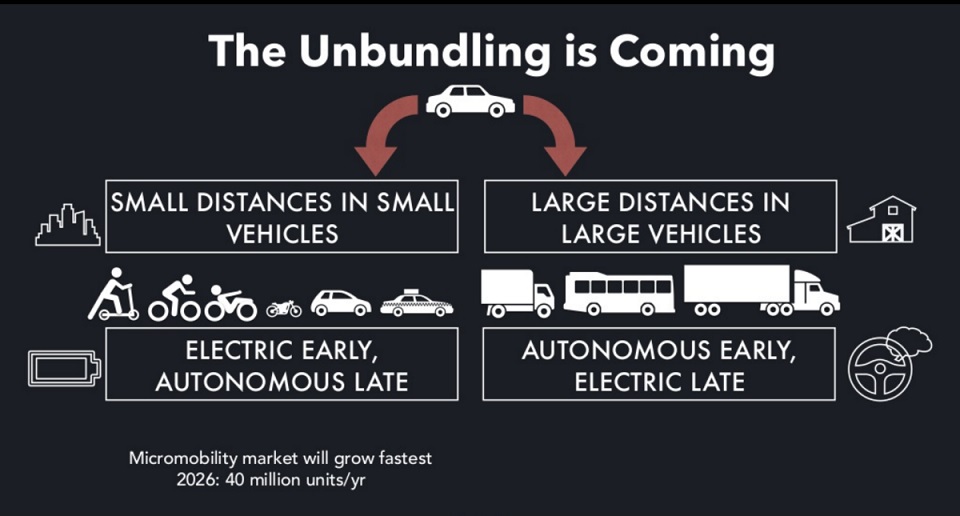
But India is an entrepreneurial market and many businesses have looked at this problem and attacked it with various models. For Yulu cofounder and CEO Amit Gupta the issue was very simple. “What was a seven-minute journey five years ago is now half an hour affair,” Gupta told Inc42, about why India needs micromobility solutions such as the one Yulu has brought to market.
A serial entrepreneur who had earlier cofounded India’s first unicorn InMobi with Naveen Tiwari and others in 2007, Gupta was tired of Bengaluru’s congested roads which stretched journey time to unreasonable limits.
“This situation is more or less the same everywhere. I saw this as an opportunity to address air pollution as well as the growing mobility issues. Mobility, today, contributes to 30% of the air pollution,” Gupta said.
Micromobility solutions such as electric bikes, scooters and bicycles not only address air pollution problems at a low-level, but also free up cars and larger vehicles for multi-person mobility, and reduces congestion on the roads.
This unbundling of mobility options – split among cabs, public transport, electric scooters and bikes – for the Indian market is part of a larger push to make India’s transport system less reliant on larger vehicles, especially when travelling short distances. It’s a major force of change in the US market, for instance.
Micromobility usually refers to 0-10 Km long trips which involve bicycles, scooters and bikes. These modes of transport are used by over 65% of households in all of India, according to the 2011 census. That’s a massive market in a country with over 1.3 Bn people. With just over 350 Mn people in the US, the micromobility market in that country has an addressable market of more than $1.4 Tn annually and is more valuable than the addressable car-based longer distance transport market , which is estimated at$1.1 Tn. As micromobility options make up the majority of all transport options in India, the market is set for rocket growth in the country.
The reason why I didn’t pursue healthcare or education because I have access to the best of them. But, in this case, I have to go through the same mess, irrespective of my financial status. I deal with that problem every day. That’s how the idea got stuck to me. – Amit Gupta

With an aim to address the rising air pollution and traffic congestion, Yulu was launched in 2017 by Gupta, RK Mishra, Hemant Gupta, and Naveen Dachuri. Initially started as a bicycle sharing platform, Yulu is aimed at providing an efficient and green solution for the first mile, last mile, and short distance commute and also reduce traffic congestion. Yulu had raised $7 Mn in funding till March 2019, and is backed by investors including Blume Ventures, 3One4, Wavemaker Partners, Incubate Fund India, Grey Cell Ventures and more.
Operating 8,500 bicycles and 500 escooters at present, while Yulu has already made its presence in three cities — Bengaluru, Navi Mumnbai and Pune — the startup recently made news headlines for its partnership with Uber. While the Yulu application will not be integrated into Uber, the Uber app will redirect users to the registration page of Yulu.
Starting From The Scratch Again
After a successful ride in his previous entrepreneurial stint with InMobi, the mobile advertising unicorn, Gupta had to start from scratch with Yulu. He said he had started pursuing the idea that would become Yulu at 39.
“Starting Yulu was something very new which I have never done in my past. So, dealing with automobile folks to government, police, goons and what not,” Gupta said about the challenge of the new venture.
“After you have achieved so much, you can’t go down. You have to look for something bigger. The best thing about being a second-time entrepreneur is that you have a different approach towards successes and failures. You know both are momentary.” – Amit Gupta
What Is The Yulu Model?
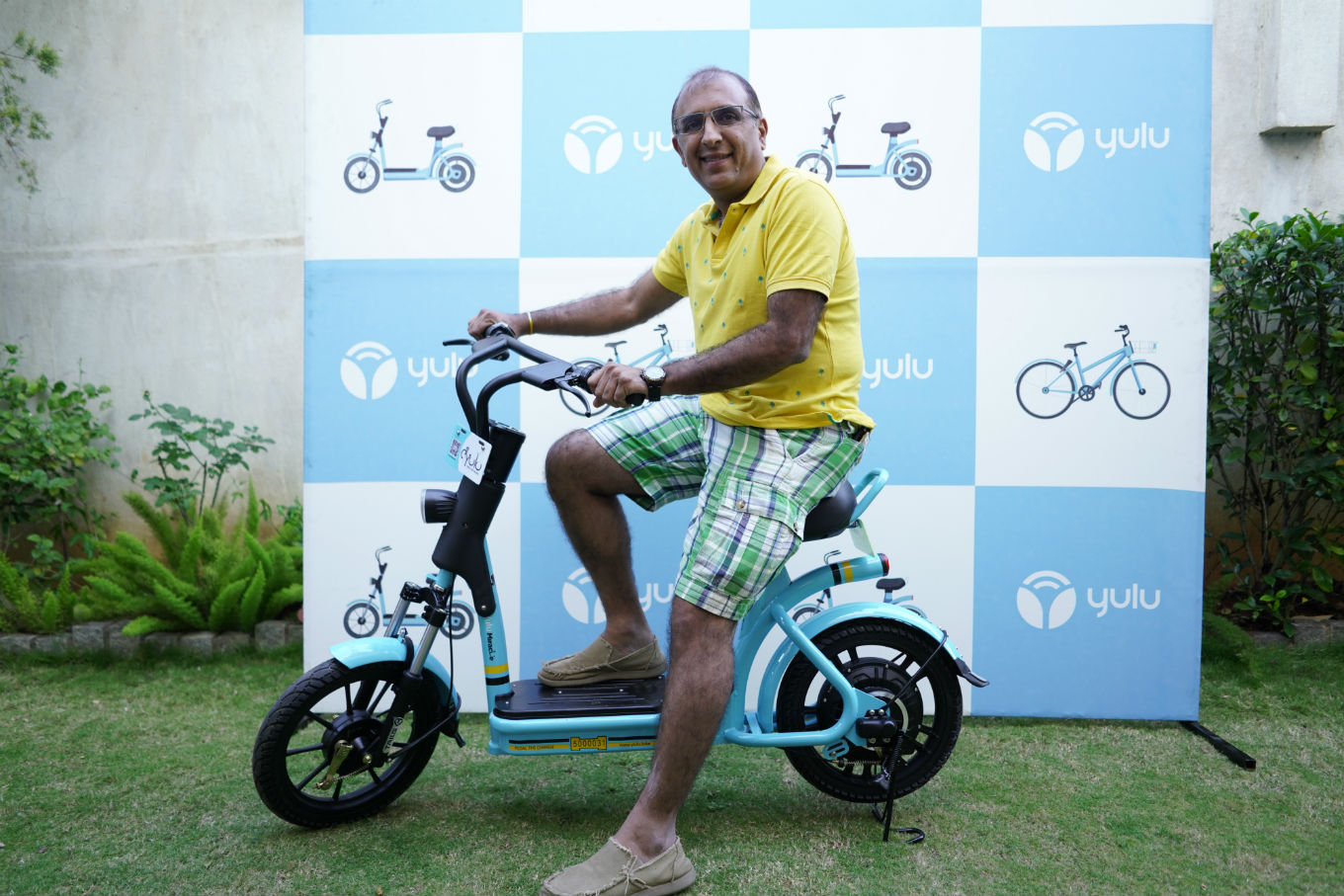
By the time Yulu launched, India already had more than half a dozen micromobility companies including the likes of Rapido, VOGO, Bounce (Previously, Metro Bikes), Mobycy, and many others. In 2016, Ola and Uber too launched operations in the form of Ola Bike Taxis and Uber Moto in various locations around the country.
Rapido, Ola Bike Taxis and Uber Moto which operate two-wheeler ride-hailing platforms for bike taxis have been banned in many states including Karnataka and Maharashtra. This is why the self-driving model which Yulu, VOGO, Bounce and others espouse has become a viable business model for micromobility companies.
However, unlike Ola-backed VOGO, Yulu’s approach has been to focus on other businesses and the government for sales. “Our model is currently more like B2G2C and B2B2C. We haven’t acquired customers on our own. For instance, we are talking here at RMZ Ecoworld. It was RMZ which gave us the parking space and sent emails to their employees about Yulu Zones at their premises.”
This approach has given Yulu close to a million customers. Gupta said Yulu has established a relationship with city authorities such as BBMP, DULT (Directorate of Urban Land Transport), Bengaluru Metro.
”We convinced them that we should create a policy otherwise the city is gonna collapse.” – Amit Gupta
Yulu initially operated on a model similar to rivals Ofo and Mobikes where customers pick up the bicycles and drop them off anywhere.
However, this brought in a number of issues. “After using the bicycle, users were dumping the bicycles anywhere and everywhere. GPS more often don’t pinpoint the location but it shows a range of 50-100 metres. Our Tata Ace vehicles had to go on a treasure hunt to locate these bicycles.”
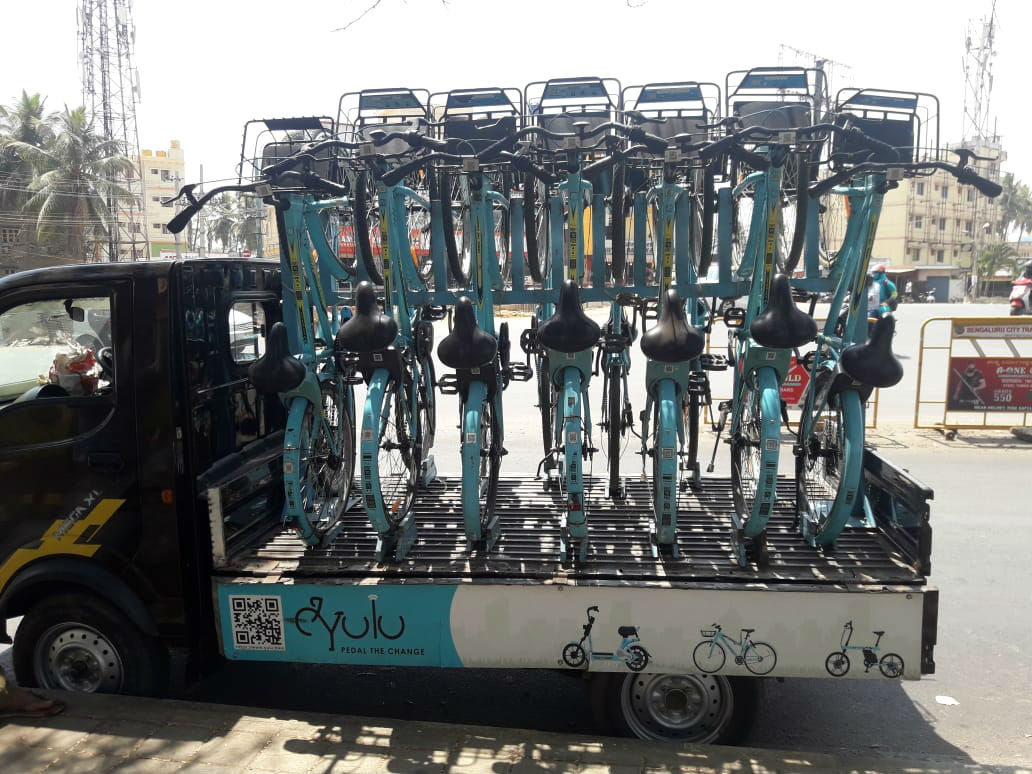
Another problem was residents in a number of localities complained to the company about unruly bike parking, which was sullying Bengaluru’s neighbourhoods.
So in 2018, Yulu changed its model and restricted the pick-up and drops to Yulu Zones only. “For the first 10 months, we ran the operations in only two pincodes of Bengaluru and two pincodes of Pune. In each area, we created hundreds of Yulu Zones so that everyone living in the area would have access to one,” Gupta added.
Going Electric
Today, with 16 clusters in Bengaluru, Pune, Mumbai and Bhubaneshwar, Yulu operates 8,500 bicycles. Out of which it has 4,500 bicycles in Bengaluru, 750 in Navi Mumbai, 500 in Bhubaneshwar and rest in Pune. In early 2019, it had brought 3K Miracle electric scooters with a speed limit of 25 Kmph for its operations. These IP65 waterproof electric scooters don’t need any road registration or driving license to be operated.
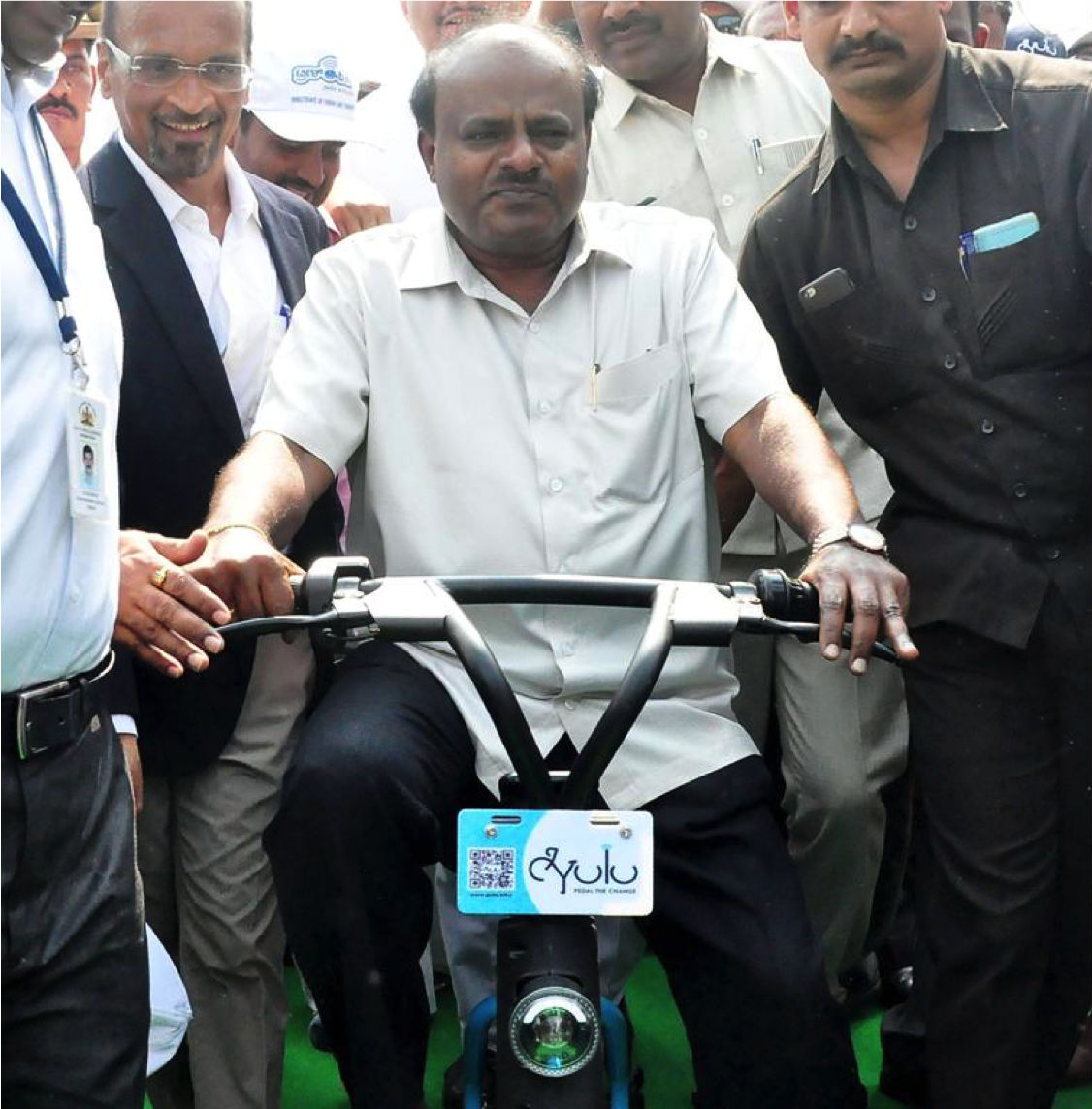
The company imports parts for the Miracle from Tianjin, China and assembles the scooter here to avoid the significantly high custom duty. The company currently has 500 such electric scooters in Indiranagar and Koramangala area. Gupta said, “We are still learning from Miracle and incorporating the changes.”
After Koramangala, the Miracle scooters will soon go live at Yulu Zones in Bengaluru’s HSR Layout. The company is also planning to launch ebicycles next month.
“Our e-cycle is ready and we will bring them to the market sometime in June and July. The reason, we delayed is because we were not operationally ready to introduce two new products in the market simultaneously,” added Gupta.
Gupta added that Yulu’s ebicycles are a premium offering and the cost of building one is close to $450 plus custom duty, about the same as a scooter.
The bikes are built out of is aluminium alloy-made and are claimed to be of a higher quality than competing offerings in terms of durability and riding experience. “We have worked with the manufacturers asked them to incorporate certain changes at the design level,” Gupta said.
Challenges And Challengers
Yulu’s rise has not come without its numerous issues be it theft, minimising maintenance cost and other challenges. And many of these issues have been dealt with in conjunction with the community. The challenges meant that Yulu had to scale back its plans of launching operations in 10 cities by this year, and now is going for launch in 5-6 cities. Mumbai, Delhi NCR and Hyderabad are some of the cities Yulu is targetting, while also planning to deepen its presence in Bengaluru, Pune and Navi Mumbai.
Talking about a particular episode of missing cycles in 2018, Gupta said that when the company set up a Yulu zone in a new location in Bengaluru, people registered and used its bicycles, but the very next day, all the cycles were gone. The Yulu Zone was empty. Thanks to the on-board IoT device, the company was able to track the missing cycles, but locals refused to return them citing the INR 100 security charge paid to Yulu. Then on the intervention of local community leaders who were approached by Yulu, the cycles were returned promptly.
From finding parking spaces to maintaining 24×7 availability of the bicycles at every Yulu Zone is not an easy job. The company purchased a slew of Tata Ace trucks to meet the service and availability requirements.
However, the challenge is not just about meeting the demand but also rising to the challengers. Yulu is not the only one in Bengaluru, challenged by VOGO, Bounce, Mobycy and others.
Catering to the same space, VOGO which has partnered with Ola, has a completely different model. VOGO operates scooters and escooters which need driving licenses and registrations. The company charges INR 5 per Km and INR 0.5 per minute for every ride.
In contrast, Yulu offers bicycles and escooters which do not need any driving license and vehicle registrations for riding. The company charges INR 10 per 30 minutes bicycles and INR 10 for every 10 minutes for escooters. This makes things easier for Yulu and lowers the maintenance cost as well.
On the rising competition in the micromobility space, Gupta said, “This is not the market where the winner takes all. Our country is big enough and in the case of micromobility, there won’t be a case where one player is dominant across the regions. Maybe, Yulu will dominant in few cities other players will be dominant in some other cities. There is enough space to co-exist and grow.”
The Big Plan
Arriving later than many of its competitors, with the Uber partnership Yulu is looking for the momentum it needs in the micromobility space. At the same time, it is also expanding cautiously in terms of fleet size and presence. fine-tuned their expansion plans. Yulu has planned to increase its operational fleet by 5x this year.
The startup has already turned profitable in 4 of 16 clusters and plans to go EBITDA positive in the next 12 months. The company currently owns all of its assets. However, it plans to introduce a fleet package investment plan for High Networth Individuals. “HNIs can put vehicles they own on lease and earn money through it. So, instead of putting money into mutual fund etc, Yulu fleet package could be another option where they can earn over 12-15% returns,” said Gupta.
Gupta said that the company has also planned to launch monthly rental plans for riders. The service will include on-the-go battery swapping and maintenance.
In the end, he says “It was never about earning money which I was doing anyway, it is about impacting lives making things easier for them.




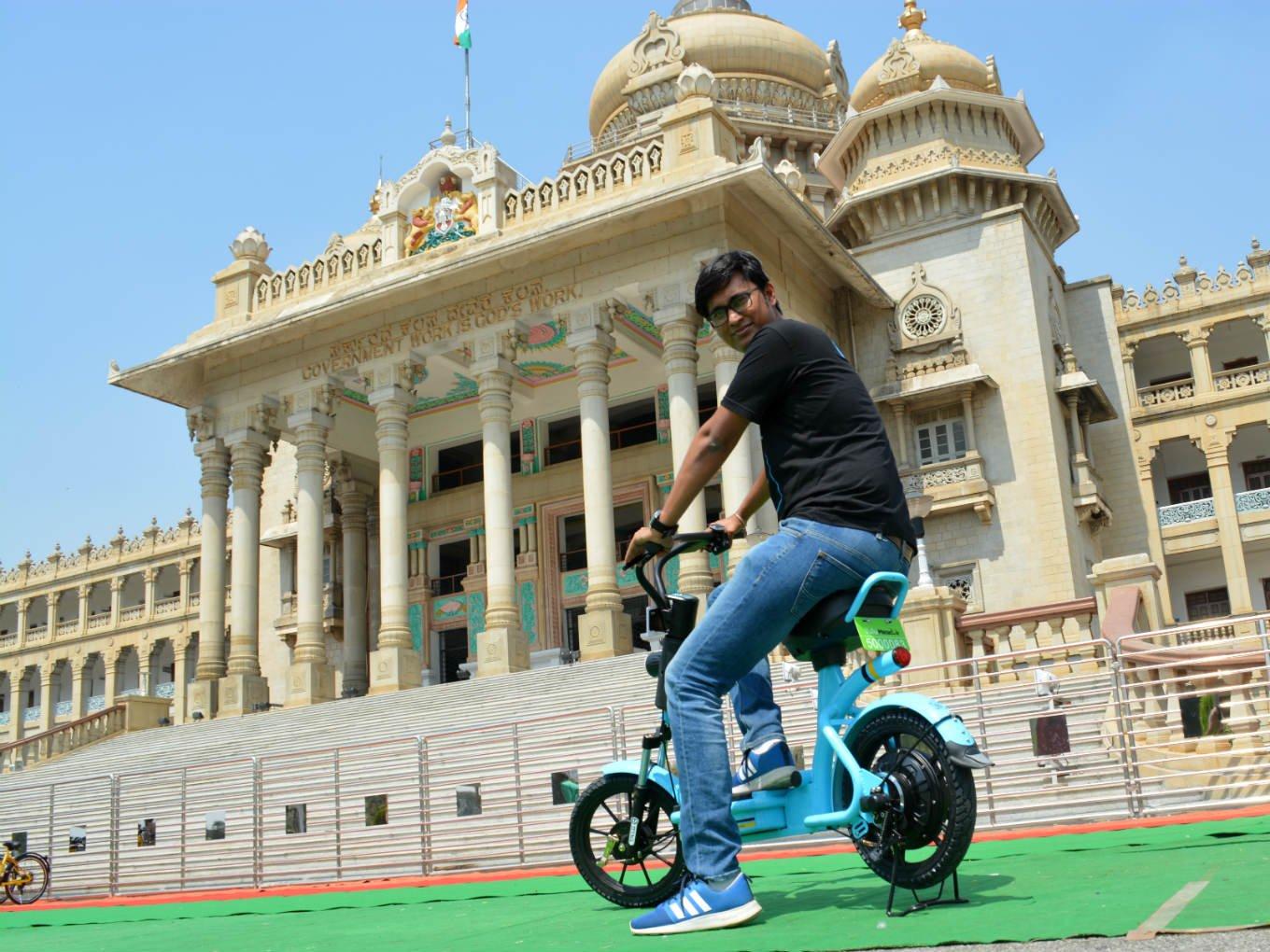





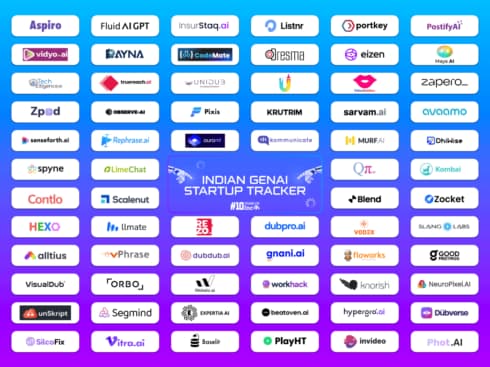





















 Ad-lite browsing experience
Ad-lite browsing experience